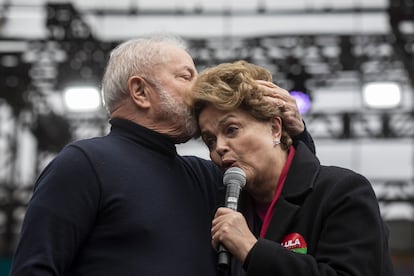The quiet rehabilitation of Brazil’s ex-president Dilma Rousseff
The former leader, impeached in 2016 and associated with corruption, has been making campaign appearances in support of Lula da Silva

For the Brazilian left, former president Dilma Rousseff is a complicated figure. Her administration (2011-16) was associated with deficits and corruption – it ended with her impeachment. However, she also enjoys the respect of her political godfather, Luiz Inácio Lula da Silva – popularly known as “Lula” – who served as president from 2003 until 2011. He is currently seeking the presidency again. While Rousseff has played a minor role in the 2022 campaign, the return of the Workers’ Party to power would imply a form of rehabilitation for Brazil’s first female president.
At the beginning of the campaign, analysts predicted that Lula would keep Rousseff on the sidelines. After all, her approval rating fell to an abysmal 8% during her second term, thanks to a recession and allegations of corruption against senior members of her party. In 2016, three-quarters of the Senate voted in favor of condemning her for allegedly cooking the government’s books to hide Brazil’s deficit problem. She was also tied to the state-run energy firm Petrobras, which was involved in contract-fixing and bribery. Two years later, voters still hadn’t forgiven her: she lost a Senate race against a virtually unknown rival.
Despite her exile from the halls of power, Rousseff has never totally disappeared from the political scene. She has maintained a close relationship with Lula. The journalist Mauricio Savarese – who interviewed her three times for his book, The Fall of Dilma, – highlights her loyalty: “I always wanted to know if she had any criticism of Lula but, if she does, she keeps it to those who are very close to her.”
Rousseff was considered a technocrat without great charisma when she won the presidency. Today, she is one of the personalities most cheered by followers of the Workers’ Party. At a recent event in the city of Porto Alegre, in the south of the country, she sat in the front row, next to the candidate Lula and his wife, Janja. Between shouts of “Dilma, Dilma!” she was presented as “the brave heart” of the left. Lula also had some words of support: “Every time she comes to an event, I am happy to see that our people recognize the injustice she has suffered.”
The figure of the former president fits well with the line of Lula’s campaign, which presents this election as a decisive moment to “restore” Brazilian democracy after four controversial years of the far-right Jair Bolsonaro. It’s also tempting to take advantage of Rousseff’s place in history as the first female president of Brazil… especially when the incumbent Bolsonaro has an extremely low approval rating among women.
“I know the strength of the Brazilian woman. Let’s vote for Lula!” said Rousseff in Porto Alegre, in a call for the female vote.
The 2016 impeachment – the biggest shadow of the Rousseff government – is now old news. A few days ago, the Prosecutor’s Office archived the case due to budget cuts. Those who once defended the ouster of the former president have begun to change their minds. Felipe Neto – one of the most followed YouTubers in Brazil – apologized this past Monday for having supported her impeachment, even posting a photo of Rousseff hugging him. The author of the impeachment petition – parliamentarian Miguel Reale Jr. – has declared his support for Lula, because, in his words, Bolsonaro’s inaction during the pandemic was “much more serious” than what Rousseff did.
However, the role of the former president in the campaign has not gone beyond a handful of opening speeches for Lula. According to political scientist Claudio Couto, from the Getulio Vargas Foundation, at this moment, Rousseff is neither an electoral asset nor a liability… but that could change.
“It could become a liability if she shows up too much. That’s why Lula talks a lot about his government’s achievements and very little about Dilma’s,” he points out.
Nor is it clear what Rousseff’s role will be if the left wins the election. She is not running as a candidate for Congress. Lula has ruled out appointing her as minister because he would not feel “comfortable” giving orders to someone who once held the highest position in the state. In addition to that, the candidate has expressed some mild criticism about his protégé. After calling Rousseff’s first term “extraordinary,” Lula said in a recent interview that he believes she made some mistakes in economic policy during her second mandate. “She already knows what I think about that,” he declared.
The journalist Savarese believes that Rousseff will remain a shadow adviser to Lula, away from the public eye. “Dilma wants to lead a more peaceful life,” he says. But the journalist also notes that he would not be surprised if a triumphant Lula would make a favorable gesture towards her during the inauguration. When Rousseff was impeached, she left the Planalto Palace – the seat of the Executive in Brasilia – in disgrace. Six years later, Lula could bring her back through the front door.
Tu suscripción se está usando en otro dispositivo
¿Quieres añadir otro usuario a tu suscripción?
Si continúas leyendo en este dispositivo, no se podrá leer en el otro.
FlechaTu suscripción se está usando en otro dispositivo y solo puedes acceder a EL PAÍS desde un dispositivo a la vez.
Si quieres compartir tu cuenta, cambia tu suscripción a la modalidad Premium, así podrás añadir otro usuario. Cada uno accederá con su propia cuenta de email, lo que os permitirá personalizar vuestra experiencia en EL PAÍS.
¿Tienes una suscripción de empresa? Accede aquí para contratar más cuentas.
En el caso de no saber quién está usando tu cuenta, te recomendamos cambiar tu contraseña aquí.
Si decides continuar compartiendo tu cuenta, este mensaje se mostrará en tu dispositivo y en el de la otra persona que está usando tu cuenta de forma indefinida, afectando a tu experiencia de lectura. Puedes consultar aquí los términos y condiciones de la suscripción digital.









































